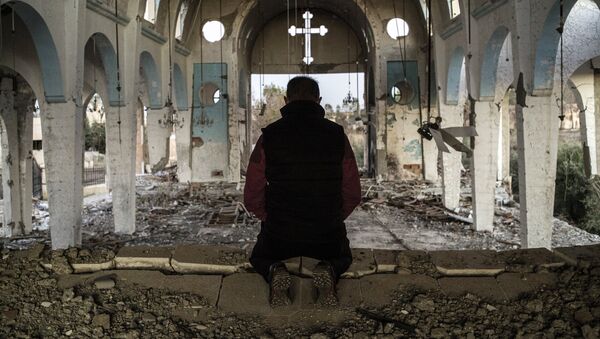The Syrian government implemented a number measures, for example restricting the display of religious emblems in schools to tackle sectarianism among students, and founded organizations and quasi-courts to settle inter-religion disputes.
Radical elements of the country's Sunni community have upset these fragile relations numerous times throughout Syria's modern history, especially in the 1970s and 1980s via the Muslim Brotherhood movement, and again during the 21st century, with hard-line Islamist groups dominating opposition forces from the infant months of the ongoing crisis.
"I've heard horror stories of family friends being killed solely due to the fact they were Christian, Alawite or Shia by Saudi and western supported terrorist groups, including the Free Syrian Army (FSA.) I firmly believe if Syria is to have a future where people of all religions and sects can live in prosperity, Assad and his government would have to remain in power. If it was not for Assad and the Syrian Army, my family and other Syrians who share my religion would have no place in Syria," Francis Hadeed, a Syrian-Trinidadian Christian told Sputnik.
Controversially, Syria's constitution has historically stipulated the President must be a Muslim. Late President Hafez al-Assad attempted to abolish this requirement in 1973, triggering protests, organized by the Muslim Brotherhood, in the cities of Homs and Hama.
In a bid to maintain national order and stability, President Hafez al-Assad opted to abandon such reform, effectively appeasing hard-line Sunni Muslims who unwaveringly opposed such an amendment.
Syria's current constitution, which came about in 2012, still insists the President must be a Muslim, though it does stress the importance of secularity throughout the country's political apparatus, and guarantees religious freedoms.
Last month, major players in the Syrian conflict — namely Russia, Iran and Turkey — met for trilateral negotiations in the city of Sochi, in a bid to find a political solution to the crisis, which has plagued Syria since 2011. Such negotiations also attempted to find common ground for a new constitution.
None of the Sochi attendees have indicated the "Muslim Presidential rule" will be scrapped. Surprisingly, there has never been protests or any sort of wide-scale political action to suggest Syria's Christians take issue with this rule, but Syria's Christians are inevitably receptive and hopeful for its abolition.
More importantly, they have been able to freely practice their religion in Syria for decades under the Baathist government's rule, and have held senior positions in the nation's security forces, cabinet, and parliament.
"Much of my family remains Syria and I can confidently say I do not have one family member who is against President Assad and the government. I often remember my visits to Syria, there was not a single house I would go to without a portrait of Bashar and his late father Hafez. My grandmother even opted to have a picture of Bashar on her birthday cake," Francis Hadeed added, outlining the support Syria's government has enjoyed for decades from the country's Christian population.
The Syrian government's current stance on the matter is unclear. With the exponential rise of many hard-line Islamist groups throughout the war, many Syrians who historically opposed a Christian President are already battling government forces, so there is no reason to continue to appease them.
However, implementing such reform could aggravate some of Syria's wider Sunni population, including millions of Sunnis currently backing the government, further inflaming sectarian tensions.
In practice, allowing Christians to run for the Presidency is unlikely to result in a Christian President in the near future, partly because such a candidate may struggle to win material support from Sunnis, but mainly because President Assad is highly popular with all of Syria's religious groups, and is effectively undefeatable by any other candidate for the foreseeable future.
The views expressed in this article are solely those of the author and do not necessarily reflect the official position of Sputnik.
Follow Suliman Mulhem on Twitter.



